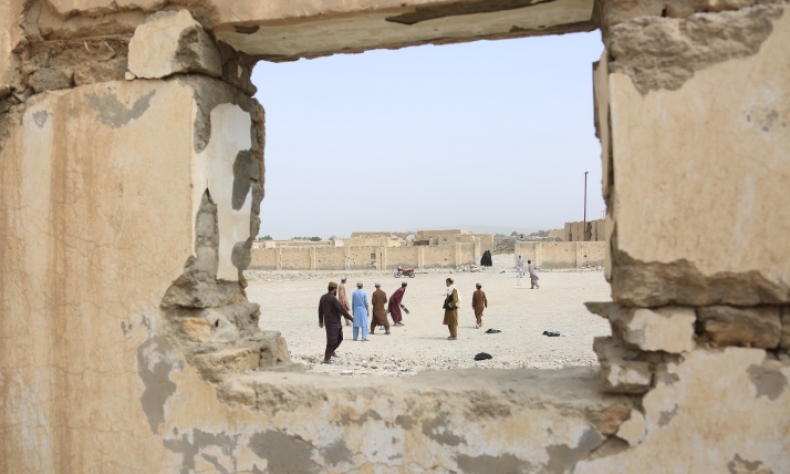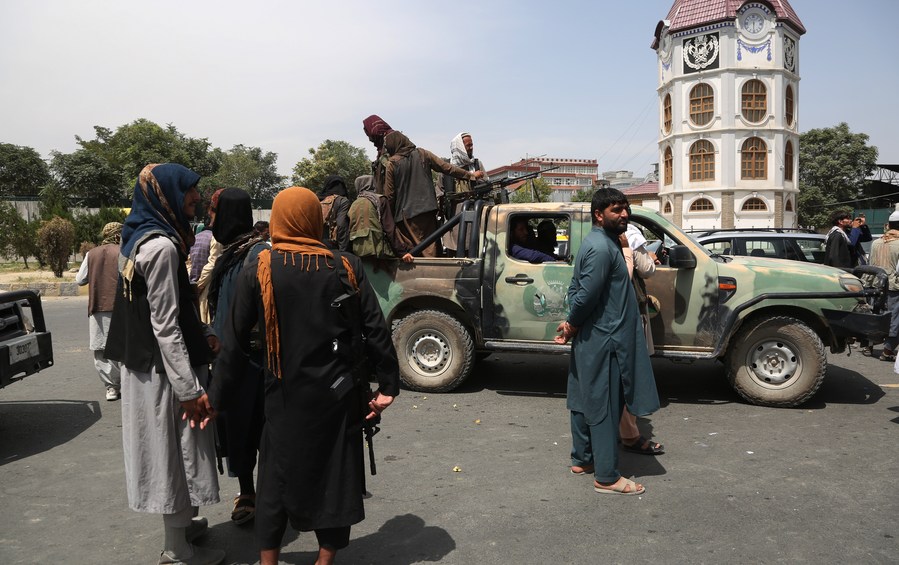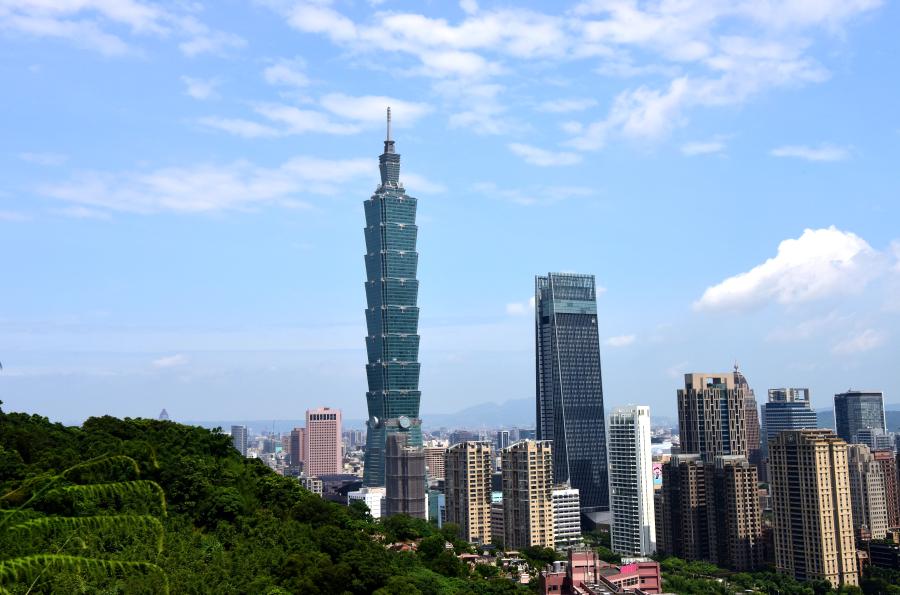The Kabul Moment: One Year Later

The Kabul moment put on full display the U.S. hypocrisy regarding democracy and human rights and its true colors of relying on power politics.
One year ago, the U.S. hastily and embarrassingly withdrew its troops from Afghanistan. Now, the fiasco still lingers in the world’s mind, the negative impact of U.S. aggression against Afghanistan persists, and Washington is yet to draw its lessons.
Relying on advanced weapons and equipment, the two-decade U.S. invasion has reduced Afghanistan to rubble and ruined the future of an entire Afghan generation. The U.S. military killed 174,000 people, including more than 30,000 civilians, and displaced millions. Even though the U.S. troops have left, Afghanistan is yet to emerge from the long shadow of the invasion. UN Secretary General António Guterres warned that millions of Afghans are on the verge of dying. One official with the World Food Program pointed out that 98 percent of them are facing food insecurity and nearly half of Afghan children under the age of 5 suffer from acute malnutrition.
The American public, too, has paid a dear price. According to U.S. nonprofit organizations, since 2001, 114,000 veterans, or 18 per day, have taken their own lives, and nearly 40,000 veterans have become homeless. The war in Afghanistan has cost the U.S. more than $2 trillion, only to end with the biggest U.S. military debacle since the Viet Nam War.
Failed transformation
U.S. political theorist Francis Fukuyama observed that the Afghan crisis marks the end of American hegemony, while the real crisis in the U.S. lies in internal polarization. President Joe Biden made his high-profile announcement “America is back” at the Munich Security Conference in early 2021; yet the Kabul moment, a moment in time remembered by many for its images of chaos, violence and crowds of desperate Afghans at the Hamid Karzai International Airport in the capital, has shown this was not the case, as the Republican Party sarcastically stated: “The Taliban is back, not the U.S.”

The supremacy of the dollar has seemingly created global economic dependence on the U.S. The country frequently wields its influence over other economies by imposing additional tariffs and sanctions or just decoupling. However, the COVID-19 pandemic has delivered unrelenting blows to the American economy, and a crazy financial capital injection has generated skyrocketing prices and inflation—rather than serving as a “cure.” Countries have started to substantially reduce their U.S. debts, give up anchoring dollars, and increase commodity trading in non-dollar currencies or gold reserves; many have begun to enhance their autonomy in economy and finance.
Whether it is the failure to fight the pandemic, or the chaotic withdrawal of troops from Afghanistan, or the worldwide de-dollarization push, they all confirm that the U.S. is well underway to losing its prestige of being a global leader.
The Kabul moment put on full display the U.S. hypocrisy regarding democracy and human rights and its true colors of relying on power politics.
Nearly 20 years of “forced transformation” imposed by the U.S. on Afghanistan has not only failed to lift the Afghan people out of poverty and turbulence, but also worsened the crisis of human survival and national development. This is yet another textbook example of how American democracy destabilizes the world.
The Biden administration has propagated “universal values” and even hosted the “Summit for Democracy” over the past year. However, the attempt to highlight “universal values” at the “Summit for Democracy” proved a stretch given the world remembered all too well the Afghan children killed in drone strikes, and the Afghans who once believed in the American commitment to democracy or human rights were simply abandoned.
Interference continues
The U.S. may have failed in Afghanistan, but it did not draw any lessons from its experiences there. Instead, it is trying to retain its hegemony by creating confrontation and mobilizing its resources to destabilize the world. It has yet to abandon its policy of interference. It still frequently meddles in other countries’ internal affairs in the name of democracy or human rights, and continues to peddle the so-called “democracy versus authoritarianism” narrative to stoke division around the world.

With no end in sight for the Ukraine crisis, the U.S. now moves to ignite another clash in Asia. Disregarding China’s stern and repeated warnings, Nancy Pelosi, Speaker of the U.S. House of Representatives, went to China’s Taiwan region in early August. This has dealt a heavy blow to the political foundation of relations between the two countries. China announced countermeasures and issued a firm and strong response to the U.S. and the provocation on the part of “Taiwan independence” separatists.
Pelosi achieved nothing by using democracy as a pretext for her visit to Taiwan. It was a political stunt that challenged the one-China principle widely accepted by the international community.
By provoking conflict in the Taiwan Straits, the U.S. is seemingly determined to rally its resources in the Indo-Pacific region to contain China’s development and undermine regional security. The international community needs to be on guard, reject the American penchant for creating chaos and turbulence in the name of democracy or human rights, and prevent another Afghan tragedy from happening.
China’s role
China has never interfered in Afghanistan’s internal affairs and never sought to establish a sphere of influence in the country.
The country has, since last year, provided multiple installments of emergency humanitarian assistance to Afghanistan to help the Afghan people safely get through the winter, and arranged 36 charter flights to import Afghan pine nuts. China is ready to continue its assistance, within its capacity, for Afghanistan’s development and revitalization, cooperate in the fields of medical care, poverty alleviation, agriculture, and disaster prevention and mitigation, and welcomes Afghanistan’s participation in the Belt and Road Initiative, a China-proposed vision for pursuing common development through better connectivity.
On July 27, China chaired a meeting of officials in charge of Afghan affairs from Afghanistan’s neighboring countries, with representatives of Russia, Pakistan, Iran and Tajikistan in attendance. Participants believed it would be conducive to pushing the international community to further consolidate consensus on cooperation related to Afghan affairs and join forces to stabilize and support Afghanistan.
They agreed to give better play to the advantages of neighboring countries to strengthen coordination and cooperation related to Afghan affairs, speed up efforts to follow up and implement the outcomes of the previous foreign ministers’ meetings on the Afghan issue among the neighboring countries of Afghanistan successively held by Pakistan, Iran and China, especially the Tunxi Initiative launched at the third meeting in March, and promote the establishment of three working groups on politics and diplomacy, economy and humanity, and security and stability as soon as possible. Under the Tunxi Initiative, all parties involved have pledged to support Afghanistan’s economic reconstruction in areas such as humanitarian assistance, connectivity, economy and trade, agriculture, energy and capacity building.
What it has done to help alleviate difficulties in Afghanistan is a strong testament to China’s readiness to team up with partners to defend the purposes and principles of the UN Charter and safeguard regional stability and world peace.
 Facebook
Facebook
 Twitter
Twitter
 Linkedin
Linkedin
 Google +
Google +










